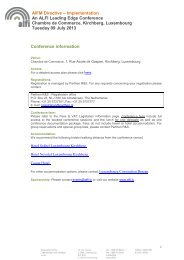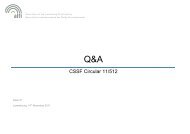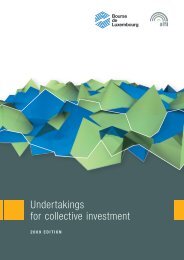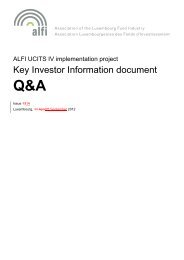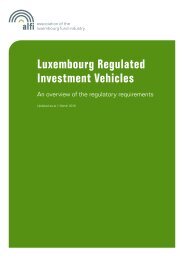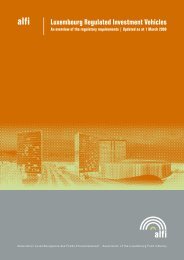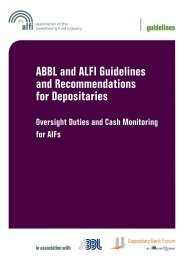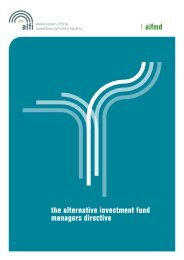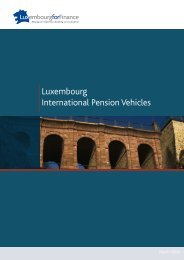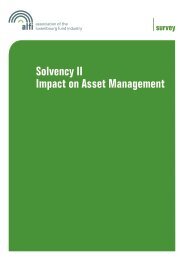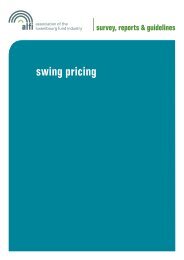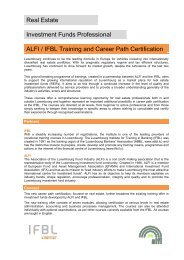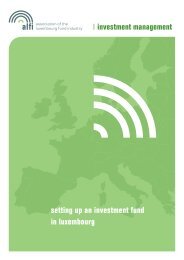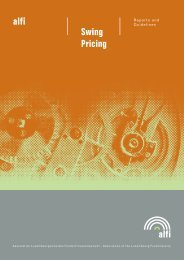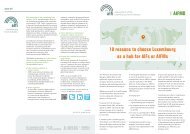Luxembourg Vehicles for Islamic Finance Structures
Luxembourg Vehicles for Islamic Finance Structures
Luxembourg Vehicles for Islamic Finance Structures
You also want an ePaper? Increase the reach of your titles
YUMPU automatically turns print PDFs into web optimized ePapers that Google loves.
<strong>Luxembourg</strong><br />
<strong>Vehicles</strong> <strong>for</strong><br />
<strong>Islamic</strong> <strong>Finance</strong>
LFF cannot be held responsible <strong>for</strong> any errors or omissions or <strong>for</strong> the results<br />
obtained from the use of the in<strong>for</strong>mation contained in this brochure.<br />
Interested parties should seek the advice of qualified professionals be<strong>for</strong>e making any decision.
2<br />
3<br />
contents<br />
6 The <strong>Luxembourg</strong> financial centre<br />
7 The <strong>Luxembourg</strong> legal environment<br />
8 Summary of commonly used<br />
<strong>Islamic</strong> finance structures<br />
10 Shariah compliant investment funds<br />
15 Real estate investment funds<br />
18 Private equity and venture capital<br />
investment funds<br />
20 Microfinance investment vehicles<br />
21 Securitisation vehicles<br />
22 Sukuk<br />
23 Wealth management<br />
25 Takaful<br />
26 Tax overview<br />
30 Glossary
Foreword<br />
<strong>Luxembourg</strong> is recognised as one of the leading European centres <strong>for</strong><br />
<strong>Islamic</strong> finance. This is not the result of a recent initiative: we have a<br />
long track record in the sector.<br />
In 1978 <strong>Luxembourg</strong> hosted the first <strong>Islamic</strong> finance institution<br />
to establish in a western country (the <strong>Islamic</strong> Banking System). In<br />
1983, the first shariah compliant insurance company in Europe was<br />
established in <strong>Luxembourg</strong> and in 2002 <strong>Luxembourg</strong> was the first<br />
European stock exchange to list a sukuk.<br />
Today, <strong>Luxembourg</strong> is the leading non-Muslim domicile <strong>for</strong> shariah<br />
compliant investment funds and is a popular stock exchange <strong>for</strong> the<br />
listing of sukuk.<br />
As Minister in charge of the financial centre and, more recently,<br />
Minister of <strong>Finance</strong>, I have lent my full support to the development of<br />
this sector, travelling with delegations to a number of Gulf Cooperation<br />
Council (GCC) and Asian markets.<br />
In April 2008 the Government set up a Task Force, charged with<br />
identifying obstacles to the development of <strong>Islamic</strong> finance and<br />
ways to support its growth. Working groups were subsequently set<br />
up by the Association of the <strong>Luxembourg</strong> Fund Industry (ALFI) and<br />
by <strong>Luxembourg</strong> <strong>for</strong> <strong>Finance</strong>, the agency <strong>for</strong> the development of the<br />
financial centre.<br />
This led to decisions on the tax treatment of shariah compliant<br />
vehicles, research into eligible assets <strong>for</strong> shariah compliant UCITS<br />
funds, the development of best practice guidelines and the launch of<br />
dedicated training courses by the <strong>Luxembourg</strong> Institute <strong>for</strong> Training in<br />
Banking (IFBL).
4<br />
5<br />
The <strong>Luxembourg</strong> Central Bank is the first European central bank to<br />
be a member of the <strong>Islamic</strong> Financial Services Board (IFSB) and is<br />
working actively to gain experience of supervisory practice in this area<br />
and identifying instruments and practices <strong>for</strong> managing liquidity in a<br />
shariah compliant manner. In May 2011 <strong>Luxembourg</strong> had the honour<br />
of hosting the IFSB Annual Summit.<br />
I believe that <strong>Luxembourg</strong> has much to offer <strong>Islamic</strong> finance clients,<br />
including:<br />
• decades of experience in dealing with an international client base and<br />
focusing on the cross-border distribution of products and services;<br />
• a legal framework that permits the creation of shariah compliant<br />
products and services;<br />
• clear guidelines from the authorities on the tax treatment of <strong>Islamic</strong><br />
finance products;<br />
• political stability.<br />
This brochure is aimed at those who are interested in setting up<br />
a shariah compliant product or service in the Grand Duchy of<br />
<strong>Luxembourg</strong>. It provides in<strong>for</strong>mation on the legal framework, tax<br />
treatment and professional services available in the financial centre.<br />
I hope it will encourage you to choose <strong>Luxembourg</strong> as the domicile <strong>for</strong><br />
your project.<br />
H.E. Luc Frieden<br />
Minister of <strong>Finance</strong>
The <strong>Luxembourg</strong><br />
financial centre<br />
<strong>Luxembourg</strong> is well known to the financial<br />
communities of many Muslim countries.<br />
It has been chosen by a number of<br />
sovereign wealth funds as the domicile<br />
<strong>for</strong> international investment structures<br />
and the <strong>Luxembourg</strong> stock exchange is<br />
one of the favourite plat<strong>for</strong>ms in Europe<br />
<strong>for</strong> the listing of sukuk.<br />
<strong>Luxembourg</strong> is a fully diversified financial<br />
centre with particular expertise in key<br />
areas. It is the second largest investment<br />
fund centre in the world after the United<br />
States and world leader in the crossborder<br />
distribution of retail investment<br />
funds. It is the largest wealth management<br />
centre in the Eurozone and the<br />
premier captive reinsurance market in<br />
the European Union.<br />
From its origins as a Eurobond and Euroloan<br />
centre in the 1960s, <strong>Luxembourg</strong><br />
subsequently grew as a private banking<br />
centre and then as a leading domicile <strong>for</strong><br />
investment funds. Besides retail investment<br />
funds, <strong>Luxembourg</strong> offers a vibrant<br />
market <strong>for</strong> hedge funds, real estate companies,<br />
private equity and venture capital<br />
vehicles and structured finance products.<br />
Defining characteristics<br />
<strong>Luxembourg</strong>’s success as a financial<br />
centre is founded on its social and<br />
political stability as well as on its bestin-class<br />
legal and regulatory environment,<br />
which is refreshed on a regular basis by<br />
consultation between the government,<br />
the legislator and the private sector. Thus,<br />
over the years, specific regulation has<br />
been introduced to enable the creation<br />
of a wide range of financial products and<br />
services. This business friendly legal environment<br />
has attracted banks, insurance<br />
companies, investment fund promoters<br />
and specialised service providers from all<br />
over the world.<br />
The financial centre stands out <strong>for</strong> its<br />
multilingual and multicultural work<strong>for</strong>ce,<br />
which has extensive experience in the<br />
needs of an international clientele. It is<br />
also characterised by a strong culture<br />
of investor protection and rigorous anti<br />
money-laundering policies.<br />
<strong>Islamic</strong> finance service<br />
providers<br />
A number of major banks, legal and audit<br />
firms, fund administration companies<br />
and other service providers have trained<br />
and active <strong>Islamic</strong> finance teams. A list<br />
of these companies can be found on our<br />
website www.islamicfinanceluxembourg.lu<br />
in the section Service Providers.
The <strong>Luxembourg</strong><br />
legal environment<br />
6<br />
7<br />
In order to review the compatibility of<br />
<strong>Luxembourg</strong> law with shariah principles, a<br />
cross-sector working group was set up by<br />
the Government in April 2008 to identify<br />
potential obstacles to the development<br />
of <strong>Islamic</strong> <strong>Finance</strong> in <strong>Luxembourg</strong>.<br />
The group reported back favourably.<br />
<strong>Luxembourg</strong> offers a wide range of<br />
structures that can be shariah compliant<br />
and address the specific needs of both<br />
investors and initiators.<br />
<strong>Luxembourg</strong> retail investment funds<br />
are governed by Part I of the Law of 17<br />
December 2010 on undertakings <strong>for</strong> collective<br />
investment (the 2010 UCI Law),<br />
which replaced previous legislation in this<br />
field. Known as undertakings <strong>for</strong> collective<br />
investment in transferable securities<br />
(UCITS), they may be structured in a<br />
shariah compliant manner. <strong>Luxembourg</strong><br />
UCITS can be sold throughout the European<br />
Union and are also widely accepted<br />
<strong>for</strong> distribution in jurisdictions around<br />
the world.<br />
Other regulated investment fund structures<br />
exist that do not have the European<br />
passport 1 but which benefit from a more<br />
flexible regulatory regime. These include<br />
undertakings <strong>for</strong> collective investment<br />
(UCIs) created under “Part II” of the<br />
law of 17 December 2010, investment<br />
companies in risk capital (SICARs) and<br />
specialised investment funds (SIFs), the<br />
last two governed by separate pieces of<br />
legislation. All may be structured in a<br />
shariah compliant manner.<br />
Financial transactions may be structured<br />
as securitisation vehicles, which may<br />
be regulated or not, depending on how<br />
often they raise capital from the public.<br />
Regulated investment funds are supervised<br />
by the financial sector supervisory<br />
authority, the Commission de surveillance<br />
du secteur financier (CSSF). The CSSF<br />
has experience in the authorisation and<br />
supervision of <strong>Islamic</strong> finance investment<br />
structures.<br />
COMPLIANCE WITH SHARIAH<br />
LAW<br />
The CSSF does not place any conditions<br />
on a fund with regard to the compatibility<br />
of its investments with shariah<br />
law. From a <strong>Luxembourg</strong> regulatory<br />
perspective, the CSSF will seek to ensure<br />
that all applicable <strong>Luxembourg</strong> legal<br />
requirements are complied with, that<br />
the persons involved in the management<br />
of a fund have the adequate expertise<br />
and that the sales documentation is<br />
sufficiently clear to allow investors to<br />
understand the consequences of their<br />
investment.<br />
1<br />
This situation will change with the implementation of the EU Alternative Investment Fund<br />
Directive which introduces a passport <strong>for</strong> alternative investment funds with effect from 2013.
Summary of<br />
commonly used <strong>Islamic</strong><br />
finance structures<br />
UCITS and<br />
UCI<br />
SIF SICAR Securitisation<br />
Vehicle<br />
SOPARFI<br />
SPF<br />
Undertakings<br />
<strong>for</strong> collective<br />
investment<br />
Specialised<br />
investment fund<br />
Investment<br />
company in risk<br />
capital<br />
<strong>Vehicles</strong> <strong>for</strong><br />
securitisation<br />
transactions<br />
Company dedicated<br />
to holding,<br />
managing and<br />
financing subsidiaries<br />
Family wealth<br />
management<br />
company <strong>for</strong><br />
the holding of<br />
financial assets<br />
Applicable<br />
regulation<br />
(see glossary<br />
<strong>for</strong> full legal<br />
reference)<br />
2010 UCI Law<br />
Part I (UCITS)<br />
and II (UCI),<br />
respectively<br />
2007 SIF Law, as<br />
amended<br />
2004 SICAR Law,<br />
as amended<br />
2004 Securitisation<br />
Law, as<br />
amended<br />
1915 Companies<br />
Law, as amended<br />
2007 Law on<br />
SPF<br />
Supervision by<br />
CSSF<br />
Yes Yes Yes No 1 No No<br />
Eligible assets<br />
Restricted <strong>for</strong><br />
UCITS Flexible<br />
<strong>for</strong> UCI<br />
Unrestricted<br />
Private Equity<br />
and Venture<br />
Capital<br />
Unrestricted Unrestricted Financial assets<br />
Risk diversification<br />
rules<br />
Yes Yes No No No No<br />
Eligible investors Unrestricted Professional and<br />
well in<strong>for</strong>med<br />
investors<br />
Professional and<br />
well in<strong>for</strong>med<br />
investors<br />
Unrestricted Unrestricted Individuals and<br />
their intermediaries<br />
1<br />
If securities are not issued to the public on a continuous basis
8<br />
9<br />
UCITS and<br />
UCI<br />
SIF SICAR Securitisation<br />
Vehicle<br />
SOPARFI<br />
SPF<br />
Tax treatment<br />
No tax except<br />
<strong>for</strong> an annual<br />
subscription tax<br />
of 0.05% on the<br />
Net Asset Value<br />
(reduced rate<br />
or exemption<br />
available)<br />
No tax except<br />
<strong>for</strong> an annual<br />
subscription tax<br />
of 0.01% on the<br />
Net Asset Value,<br />
except if exempt<br />
Corporation<br />
taxes at a combined<br />
rate of<br />
28.80% 2 but full<br />
tax exemption<br />
on income from<br />
securities invested<br />
in venture<br />
capital<br />
Corporation<br />
taxes at a<br />
combined rate<br />
of 28.80% 2 , but<br />
any distributions<br />
made or declared<br />
to be made<br />
to investors are<br />
tax deductible<br />
Corporation<br />
taxes at a<br />
combined rate<br />
of 28.80% 2 .<br />
Net worth tax<br />
at 0.5%<br />
No corp. tax<br />
unless 5%+<br />
of dividends<br />
received from<br />
companies not<br />
subject to the<br />
equivalent of<br />
Lux corporate<br />
tax. Annual<br />
subscription tax<br />
of 0.25% with<br />
a maximum of<br />
€125,000<br />
Required service<br />
providers<br />
Auditor, Administrator,<br />
Central<br />
depository<br />
Auditor, Administrator,<br />
Central<br />
depository<br />
Auditor, Administrator,<br />
Central<br />
depository<br />
Auditor Auditor Domiciliation<br />
agent and/or<br />
auditor<br />
Practical<br />
application <strong>for</strong><br />
shariah compliant<br />
products<br />
to be reviewed<br />
on a case by<br />
case basis<br />
Mudarabah<br />
Musharakah<br />
Murabahah<br />
Ijara<br />
Mudarabah<br />
Musharakah<br />
Ijarah<br />
Murabahah<br />
Ijarah<br />
Sukuk<br />
Mudarabah<br />
Musharakah<br />
Murabahah<br />
Ijarah<br />
Holding of<br />
<strong>Islamic</strong> financial<br />
assets<br />
Benefit from tax<br />
treaties<br />
Yes if in the <strong>for</strong>m<br />
of a SICAV 3<br />
Yes if in the <strong>for</strong>m<br />
of SICAV 3<br />
Yes 3 Yes 3 Yes 3 No<br />
EU Passport Yes <strong>for</strong> UCITS No No Yes No No<br />
2<br />
Rate applicable in the city of <strong>Luxembourg</strong><br />
3<br />
Individual treaties to be checked
Shariah compliant<br />
investment funds<br />
Well adapted fund<br />
structures<br />
<strong>Luxembourg</strong>’s position as the leading<br />
centre <strong>for</strong> internationally distributed<br />
investment funds, combined with the<br />
financial centre’s growing expertise in <strong>Islamic</strong><br />
finance, make the country an ideal<br />
location <strong>for</strong> the creation, administration<br />
and cross-border distribution of shariah<br />
compliant investment vehicles.<br />
<strong>Luxembourg</strong>: fifth largest<br />
<strong>Islamic</strong> fund domicile<br />
worldwide<br />
<strong>Luxembourg</strong> is rapidly becoming a<br />
hub <strong>for</strong> shariah compliant investment<br />
funds, with promoters keen to harness<br />
the country’s strengths and expertise<br />
in cross-border fund distribution. The<br />
figures speak <strong>for</strong> themselves: Ernst &<br />
Young’s 2010 <strong>Islamic</strong> Funds & Investments<br />
Report ranks <strong>Luxembourg</strong> as<br />
the fifth largest domicile <strong>for</strong> shariah<br />
compliant investment funds.<br />
<strong>Luxembourg</strong> offers a variety of attractive<br />
fund structures <strong>for</strong> shariah compliant<br />
investment.<br />
Over the last 20 years, <strong>Luxembourg</strong> has<br />
built its position as the most popular<br />
domicile <strong>for</strong> UCITS. Originally created as<br />
a retail product, UCITS are widely sold<br />
both to the public and to corporate and<br />
institutional investors. Benefiting from<br />
a European distribution passport, UCITS<br />
are marketed across the European Union<br />
and in many other countries around the<br />
world including countries in Asia, Latin<br />
America and increasingly the Middle East.<br />
For example, 600 <strong>Luxembourg</strong> funds are<br />
registered in Bahrain. <strong>Luxembourg</strong> has<br />
positioned itself as the leading hub <strong>for</strong><br />
international distribution of investment<br />
funds: 75% of all funds sold cross-border<br />
are domiciled in the Grand Duchy 1 . This<br />
expertise in cross-border distribution<br />
makes <strong>Luxembourg</strong> the ideal location <strong>for</strong><br />
the domiciliation of shariah compliant<br />
funds created to be sold to retail or institutional<br />
investors around the world.<br />
At the same time, <strong>Luxembourg</strong> has developed<br />
a strong track record in alternative<br />
investment products such as hedge<br />
funds, funds of hedge funds, private<br />
equity and real estate funds. <strong>Structures</strong><br />
such as the specialised investment fund<br />
(SIF), which allows a wide range of different<br />
investment types, can be used<br />
<strong>for</strong> private equity, real estate or other<br />
alternative investment schemes aimed at<br />
institutional or high net worth investors.<br />
The table Comparison of structures<br />
commonly used <strong>for</strong> shariah compliant<br />
investment funds provides an overview of<br />
the legal and regulatory framework <strong>for</strong><br />
UCITS, “Part II” UCIs and SIFs.<br />
1<br />
Source: PwC, Global Fund Distribution Chart 2011.
10<br />
11<br />
While the choice of regime will depend<br />
upon the investment strategy selected<br />
and the investor base targeted, most<br />
shariah compliant funds launched in <strong>Luxembourg</strong><br />
are structured either as UCITS<br />
or as SIFs. A number of shariah compliant<br />
funds have adopted the UCITS structure,<br />
which is well suited to the principles<br />
underlying <strong>Islamic</strong> finance. UCITS funds<br />
are also used by <strong>Islamic</strong> fund promoters<br />
seeking broad distribution to retail or institutional<br />
investors around the world. By<br />
contrast, the SIF structure is often used<br />
<strong>for</strong> shariah compliant real estate and<br />
private equity funds reserved <strong>for</strong> institutional<br />
and in<strong>for</strong>med investors.<br />
Top 5 shariah compliant<br />
fund domiciles<br />
by number of legal structures 1<br />
Saudi Arabia<br />
Malaysia<br />
Cayman<br />
Bahrain<br />
<strong>Luxembourg</strong><br />
29<br />
57<br />
46<br />
171<br />
225<br />
0 50 100 150 200 250 300<br />
Source: Ernst & Young <strong>Islamic</strong><br />
Funds & Investments Report 2011<br />
1<br />
The existence of multiple class investment<br />
funds brings the total number of shariah<br />
compliant investment classes to 38.<br />
“We chose <strong>Luxembourg</strong> as our domicile <strong>for</strong> HSBC Amanah’s<br />
shariah compliant UCITS because of its brand and reputation<br />
as a fund centre, its expertise and skills in fund operations,<br />
and its global reach <strong>for</strong> fund distribution.”<br />
Razi Fakih, Deputy CEO, HSBC Amanah
Shariah compliant<br />
investment funds<br />
Well adapted fund<br />
structures<br />
<strong>Luxembourg</strong>’s position as the leading<br />
centre <strong>for</strong> internationally distributed<br />
investment funds, combined with the<br />
financial centre’s growing expertise in <strong>Islamic</strong><br />
finance, make the country an ideal<br />
location <strong>for</strong> the creation, administration<br />
and cross-border distribution of shariah<br />
compliant investment vehicles.<br />
<strong>Luxembourg</strong>: fifth largest<br />
<strong>Islamic</strong> fund domicile<br />
worldwide<br />
<strong>Luxembourg</strong> is rapidly becoming a<br />
hub <strong>for</strong> shariah compliant investment<br />
funds, with promoters keen to harness<br />
the country’s strengths and expertise<br />
in cross-border fund distribution. The<br />
figures speak <strong>for</strong> themselves: Ernst &<br />
Young’s 2010 <strong>Islamic</strong> Funds & Investments<br />
Report ranks <strong>Luxembourg</strong> as<br />
the fifth largest domicile <strong>for</strong> shariah<br />
compliant investment funds.<br />
<strong>Luxembourg</strong> offers a variety of attractive<br />
fund structures <strong>for</strong> shariah compliant<br />
investment.<br />
Over the last 20 years, <strong>Luxembourg</strong> has<br />
built its position as the most popular<br />
domicile <strong>for</strong> UCITS. Originally created as<br />
a retail product, UCITS are widely sold<br />
both to the public and to corporate and<br />
institutional investors. Benefiting from<br />
a European distribution passport, UCITS<br />
are marketed across the European Union<br />
and in many other countries around the<br />
world including countries in Asia, Latin<br />
America and increasingly the Middle East.<br />
For example, 600 <strong>Luxembourg</strong> funds are<br />
registered in Bahrain. <strong>Luxembourg</strong> has<br />
positioned itself as the leading hub <strong>for</strong><br />
international distribution of investment<br />
funds: 75% of all funds sold cross-border<br />
are domiciled in the Grand Duchy 1 . This<br />
expertise in cross-border distribution<br />
makes <strong>Luxembourg</strong> the ideal location <strong>for</strong><br />
the domiciliation of shariah compliant<br />
funds created to be sold to retail or institutional<br />
investors around the world.<br />
At the same time, <strong>Luxembourg</strong> has developed<br />
a strong track record in alternative<br />
investment products such as hedge<br />
funds, funds of hedge funds, private<br />
equity and real estate funds. <strong>Structures</strong><br />
such as the specialised investment fund<br />
(SIF), which allows a wide range of different<br />
investment types, can be used<br />
<strong>for</strong> private equity, real estate or other<br />
alternative investment schemes aimed at<br />
institutional or high net worth investors.<br />
The table Comparison of structures<br />
commonly used <strong>for</strong> shariah compliant<br />
investment funds provides an overview of<br />
the legal and regulatory framework <strong>for</strong><br />
UCITS, “Part II” UCIs and SIFs.<br />
1<br />
Source: PwC, Global Fund Distribution Chart 2011.
Comparison of structures commonly<br />
used <strong>for</strong> shariah compliant investment funds<br />
SIF PART II UCI Part I UCITS<br />
Applicable law 2007 SIF Law Part II of the 2010 UCI Law Part I of the 2010 UCI Law<br />
Eligible investors Well in<strong>for</strong>med investors Retail, institutional and<br />
professional investors<br />
Retail, institutional and<br />
professional investors<br />
Ease of set-up<br />
CSSF approval required, but<br />
launch possible prior to approval.<br />
Approval application must<br />
be made within one month<br />
from creation of the SIF.<br />
CSSF approval required.<br />
Authorisation must be<br />
received prior to starting the<br />
activities of the UCI.<br />
CSSF approval required.<br />
Authorisation must be<br />
received prior to starting the<br />
activities of the UCITS.<br />
Eligible assets Unrestricted Flexible Restricted<br />
Investments restrictions<br />
No specific investment and<br />
borrowing restrictions in the<br />
2007 SIF Law, but flexible<br />
principle based risk diversification<br />
requirements.<br />
Yes - quantitative & qualitative<br />
(provisions of Part II of<br />
the 2010 UCI Law, and CSSF<br />
Circulars).<br />
Yes - quantitative & qualitative<br />
(provisions of Part I<br />
of 2010 UCI Law and CSSF<br />
Circulars).<br />
CSSF has set benchmark<br />
restrictions which can be<br />
adapted <strong>for</strong> specific projects.<br />
Max. 30% of the SIF’s assets<br />
can be invested in securities<br />
of the same type of the same<br />
issuer.<br />
Risk management<br />
An appropriate risk management<br />
procedure should be in<br />
place.<br />
A defined risk management<br />
procedure must be in place.<br />
A defined risk management<br />
procedure must be in place.<br />
Cross-border distribution<br />
No European passport. In<br />
principle, distribution on a<br />
private placement basis.<br />
No European passport.<br />
Distribution on a private placement<br />
basis or via specific<br />
registration<br />
Cross-border distribution in the<br />
EU via the European passport<br />
and in many other countries<br />
via bi-lateral agreements.<br />
Approval of initiator<br />
[to be checked]<br />
No<br />
Yes<br />
(financial resources,<br />
experience, reputation)<br />
Yes<br />
(financial resources,<br />
experience, reputation)<br />
Substance in <strong>Luxembourg</strong>/<br />
nationality or residency<br />
requirements<br />
Head office of SICAV/SICAF<br />
or management company of<br />
FCP in <strong>Luxembourg</strong>.<br />
No nationality/residency<br />
requirements <strong>for</strong> directors/<br />
managers.<br />
Head office of SICAV/SICAF<br />
or management company of<br />
FCP in <strong>Luxembourg</strong>.<br />
No nationality/residency<br />
requirements <strong>for</strong> directors/<br />
managers.<br />
SICAV or management<br />
company of FCP established<br />
in <strong>Luxembourg</strong> or else use<br />
of a Management Company<br />
established in another EU<br />
country.<br />
No nationality/residency<br />
requirements <strong>for</strong> directors/<br />
managers.
12<br />
13<br />
SIF PART II UCI Part I UCITS<br />
Required service providers<br />
Depositary<br />
Depositary<br />
Depositary<br />
Central administration agent<br />
Auditor<br />
Central administration agent<br />
Auditor<br />
Central administration agent<br />
(except where a non-<strong>Luxembourg</strong><br />
EU UCITS Management<br />
Company is used)<br />
Auditor<br />
Approval of management<br />
Yes<br />
Yes<br />
Yes<br />
(experience, reputation)<br />
(experience, reputation)<br />
(experience, reputation)<br />
Possible listing Yes Yes Yes<br />
Minimum content of<br />
prospectus<br />
No specific content of prospectus<br />
prescribed by the SIF<br />
Law; must contain essential<br />
in<strong>for</strong>mation enabling investors<br />
to make an in<strong>for</strong>med<br />
judgment of the contemplated<br />
investment<br />
Yes<br />
Yes<br />
Legal <strong>for</strong>ms<br />
• Investment company with<br />
variable capital (SICAV) to<br />
be incorporated as a:<br />
- public limited company<br />
(SA)<br />
- private limited company<br />
(Sàrl)<br />
- cooperative company organised<br />
as a public limited<br />
company (SCoSA)<br />
- partnership limited by<br />
shares (SCA);<br />
• Investment company with<br />
fixed capital (SICAF) to<br />
be incorporated in various<br />
legal <strong>for</strong>ms, such as e.g. a<br />
public limited company (SA)<br />
or a corporate partnership<br />
limited by shares (SCA).<br />
• Investment company with<br />
variable capital (SICAV) to<br />
be incorporated as a public<br />
limited company (SA)<br />
• Investment company with<br />
fixed capital (SICAF) to<br />
be incorporated in various<br />
legal <strong>for</strong>ms, such as e.g. a<br />
public limited company (SA)<br />
or a corporate partnership<br />
limited by shares (SCA)<br />
• Common fund (FCP)<br />
• Investment company with<br />
variable capital (SICAV) to<br />
be incorporated as a public<br />
limited company (SA)<br />
• Investment company with<br />
fixed capital (SICAF) to<br />
be incorporated in various<br />
legal <strong>for</strong>ms, such as e.g. a<br />
public limited company (SA)<br />
or a corporate partnership<br />
limited by shares (SCA)<br />
• Common fund (FCP).<br />
• Common fund (FCP)
Minimum capital/net assets<br />
SIF PART II UCI Part I UCITS<br />
Yes<br />
(€1,250,000 to be reached<br />
within 12 months)<br />
Yes<br />
(€1,250,000 to be reached<br />
within 6 months)<br />
Yes<br />
(€1,250,000 to be reached<br />
within 6 months)<br />
Paid–up capital<br />
• Possibility of issuing partly<br />
paid shares in a SICAV/SICAF<br />
(up to 5% at least) and<br />
partly paid units in a FCP<br />
• Possibility of issuing partly<br />
paid shares in a SICAF (up<br />
to 25% at least) and partly<br />
paid units in a FCP<br />
• Possibility of issuing partly<br />
paid shares in a SICAF (up<br />
to 25% at least) and partly<br />
paid units in a FCP<br />
• Units/shares do not have<br />
to be issued or redeemed<br />
at NAV<br />
• Units/shares have to be<br />
issued or redeemed at NAV,<br />
except in a SICAF<br />
• Units/shares have to be<br />
issued or redeemed at NAV<br />
Sub-funds Yes Yes Yes<br />
Multiple share classes,<br />
series<br />
Yes Yes Yes<br />
Issue/Redemption restrictions<br />
No<br />
(freely determined)<br />
No<br />
(freely determined)<br />
No<br />
(freely determined, but redemptions<br />
must be possible<br />
at least twice a month)<br />
Restrictions on dividend<br />
distribution<br />
No<br />
(but not below minimum<br />
capital/net assets)<br />
No<br />
(but not below minimum<br />
capital/net assets)<br />
No<br />
(but not below minimum<br />
capital/net assets)<br />
Reporting requirements<br />
Yes<br />
Yes<br />
Yes<br />
(annual report)<br />
(semi-annual and annual<br />
report + NAV calculation at<br />
least once a month)<br />
(semi-annual and annual<br />
report + long-<strong>for</strong>m report<br />
+ NAV calculation at least<br />
twice a month)<br />
Subscription tax<br />
Yes<br />
Yes<br />
Yes<br />
(0.01% of net assets, except<br />
exemptions)<br />
(0.05% of net assets, except<br />
exemptions or reduced rate<br />
of 0.01%)<br />
(0.05% of net assets, except<br />
exemptions or reduced rate<br />
of 0.01%)<br />
Corporate income tax and<br />
municipal business tax<br />
No No No<br />
Withholding taxes (on<br />
dividends)<br />
No<br />
(except if EU savings directive<br />
is applied)<br />
No<br />
(except if EU savings directive<br />
is applied)<br />
No<br />
(except if EU savings directive<br />
is applied)<br />
Double tax treaties benefit Yes 1 Yes 1 Yes 1<br />
1<br />
Depending on the applicable tax treaty (to be verified on a case by case basis)
Real estate<br />
investment funds<br />
14<br />
15<br />
<strong>Luxembourg</strong> is recognised as a leading<br />
location <strong>for</strong> real estate funds with<br />
cross-border investments. <strong>Luxembourg</strong><br />
investment structures appeal to investors<br />
who seek a robust plat<strong>for</strong>m <strong>for</strong> international<br />
investment strategies, combined<br />
with a flexible regulatory regime and<br />
efficient tax results. <strong>Luxembourg</strong> offers<br />
investment vehicles with varying degrees<br />
of regulation, tax efficient repatriation<br />
models and a pro-active attitude in addressing<br />
the needs of a rapidly changing<br />
global economy.<br />
The number of shariah compliant real<br />
estate funds is still small compared to<br />
conventional real estate funds, but the<br />
sector is growing rapidly. An increasing<br />
number of fund managers, particularly<br />
from the Middle East North Africa<br />
(MENA) region, have recently created<br />
shariah compliant real estate investment<br />
vehicles in <strong>Luxembourg</strong>. They are<br />
drawn by an attractive tax regime, a well<br />
adapted legislative framework, the availability<br />
of professional expertise and a<br />
skilled, multi-lingual work<strong>for</strong>ce.<br />
Whilst the establishment of a fund and<br />
its operations may not vary significantly<br />
between a conventional real estate fund<br />
and its shariah compliant equivalent, four<br />
constraints usually need to be addressed<br />
by fund managers:<br />
1. shariah compliant structuring;<br />
2. selection and use of underlying real<br />
estate assets;<br />
3. financing alternatives;<br />
4. shariah compliant governance rules.<br />
In this respect, <strong>Luxembourg</strong> offers an appropriate<br />
legal and tax environment that<br />
provides solutions to these constraints.<br />
Vehicle domiciles <strong>for</strong><br />
non-listed European<br />
real estate funds<br />
invested internationally<br />
<strong>Luxembourg</strong><br />
Germany<br />
United<br />
Kingdom<br />
Netherlands<br />
USA<br />
Italy<br />
Guernsey<br />
Sweden<br />
France<br />
Jersey<br />
Other<br />
countries<br />
0 10 20 30 40 50 60 70<br />
Source: INREV vehicles database,<br />
August 2009
Structuring shariah<br />
compliant real estate funds<br />
in <strong>Luxembourg</strong><br />
Shariah compliant real estate investment<br />
can be achieved in different ways, <strong>for</strong><br />
example by using a mudarabah or ijarah<br />
contract, depending on the commercial<br />
objectives. The mudarabah model mirrors<br />
the conventional structure of real<br />
estate funds from a legal perspective. For<br />
example, a mudarabah contract is similar<br />
to the relationship between a fund<br />
manager (general partner) and investors<br />
in a fund (limited partners), or a management<br />
company and its unit holders. By<br />
contrast, an ijarah contract is considered<br />
to be sale of the usufruct of an asset<br />
(payment of a rent <strong>for</strong> the right to use<br />
the asset). In general, the rules governing<br />
ijarah may be considered to be similar<br />
to those governing conventional leases,<br />
subject to a number of restrictions or<br />
modifications.<br />
Fund vehicles in <strong>Luxembourg</strong> provide<br />
various options when structuring<br />
mudarabah contracts. The choice of the<br />
appropriate vehicle generally depends<br />
on the style (i.e. core, value added or<br />
opportunistic), operating model and<br />
tax structuring of the fund.<br />
Continuing with our example of mudarabah<br />
contracts within the sphere of<br />
regulated real estate funds, specialised<br />
investment funds (SIFs) provide a useful<br />
degree of flexibility. A shariah compliant<br />
SIF may be structured as a corporation,<br />
that is as a public limited company<br />
(société anonyme, SA) a private limited<br />
company (société à responsibilité limité,<br />
Sàrl), in the <strong>for</strong>m of a partnership limited<br />
by shares (société en commandite par actions,<br />
SCA), or as a common investment<br />
fund (fonds commun de placement, FCP).<br />
Alternatively, in the case of an opportunistic<br />
real estate fund, an investment<br />
company in risk capital (SICAR) may be<br />
more suitable.<br />
Eligible investors<br />
SICARs and SIFs are designed <strong>for</strong> qualified<br />
investors who require or accept a<br />
low level of protection. Investors must be<br />
“well-in<strong>for</strong>med”, meaning institutional<br />
and professional investors and anyone<br />
else who invests at least €125,000 and<br />
confirms that he or she has the expertise<br />
and experience to make an in<strong>for</strong>med<br />
judgement on the scheme.<br />
Both vehicles can be listed on the<br />
<strong>Luxembourg</strong> stock exchange, providing<br />
they meet certain conditions.<br />
Asset selection<br />
The challenges that a shariah compliant<br />
portfolio manager faces should not be<br />
different from those faced by any other<br />
portfolio manager. The manager sets a<br />
commercial policy and this drives the<br />
asset selection criteria. The commercial<br />
policy of a fund will depend on the type<br />
of assets it will hold, investor expectations,<br />
governance rules and the underlying<br />
asset transactions. Shariah compliant<br />
asset allocation can be achieved by<br />
putting in place a robust investment<br />
strategy and a careful selection process;<br />
residential buildings, production facilities<br />
and infrastructure facilities are typically<br />
acceptable.<br />
Neither a SIF nor a SICAR is required<br />
to comply with detailed restrictions or<br />
leverage rules under <strong>Luxembourg</strong> law.<br />
Nevertheless, a SIF must adhere to the<br />
principle of risk diversification, meaning<br />
that the fund may not invest more than<br />
30% of its assets in a single investment.<br />
In the case of a real estate SIF, this<br />
requirement can be met by investing<br />
in diversified geographical segments or<br />
types of assets. By contrast, a SICAR may<br />
concentrate its holdings in one project;<br />
the only requirement is to invest in risk<br />
capital.
16<br />
17<br />
Financing<br />
The major problem with property investment<br />
is that liquidity is tied up <strong>for</strong> a longer<br />
duration and turnover of properties is<br />
often slow, since real estate investments<br />
are usually long term in nature. This<br />
challenge is more pronounced in shariah<br />
compliant real estate funds, where external<br />
debt financing is prohibited. However,<br />
the problem can be addressed by financing<br />
the acquisition of properties through<br />
alternative instruments, in particular by<br />
issuing sukuk related to a suitable <strong>Islamic</strong><br />
contract such as Sukuk al-murabahah<br />
(sales based financing) or Sukuk al-ijarah<br />
(lease based financing).<br />
Another solution is to open the investment<br />
to additional equity based investors<br />
using the musharakah model:<br />
partnership based financing. These<br />
<strong>Islamic</strong> financing structures can easily be<br />
replicated through existing <strong>Luxembourg</strong><br />
structures. As mentioned earlier, local<br />
laws applicable to SIF and SICAR do not<br />
impose any leverage rules. There<strong>for</strong>e, the<br />
asset managers have relative flexibility<br />
in structuring the transaction in such a<br />
way that it meets the requirement of<br />
shariah rules and principles while bringing<br />
tax and operational efficiency to the<br />
structure.<br />
Governance<br />
The assets of a SICAR or SIF are managed<br />
by a board of directors (or a management<br />
company, when the SIF is structured<br />
as an FCP), assisted and advised<br />
by an investment manager or advisor.<br />
The specific features of a shariah scheme<br />
normally require that a shariah advisor<br />
or a shariah board be appointed by the<br />
Board of Directors or the Manager in the<br />
case of a management company.<br />
“When, back in 2004, we had the ambition of launching one<br />
of the first shariah compliant pan-European real estate funds<br />
<strong>for</strong> our Middle Eastern clients, we could not find a better<br />
place than <strong>Luxembourg</strong> in terms of flexibility, expertise and<br />
regulations <strong>for</strong> the set-up and operational management of<br />
our innovative product. We intend to grow our <strong>Luxembourg</strong><br />
plat<strong>for</strong>m with further product launches in the coming years.”<br />
Rachid Ouaich, Director, <strong>Luxembourg</strong> operations,<br />
Wafra Capital Partners LP
Private equity and venture<br />
capital investment funds<br />
Under <strong>Luxembourg</strong> law, two regulated<br />
vehicles are mainly used to structure<br />
private equity investments.<br />
The first is the investment company in<br />
risk capital (SICAR), which was introduced<br />
by the law of 15 June 2004. The<br />
SICAR is an investment vehicle specifically<br />
designed <strong>for</strong> private equity investment<br />
and venture capital. The second<br />
is the specialised investment fund (SIF),<br />
introduced by the Law of 13 February<br />
2007, which provides an operationally<br />
flexible and fiscally efficient multipurpose<br />
fund vehicle that can be used <strong>for</strong><br />
private equity.<br />
The SICAR and the SIF are both regulated<br />
investment vehicles subject to approval<br />
and ongoing supervision by the CSSF.<br />
The SIF allows <strong>for</strong> an increased speed<br />
to market since it does not require prior<br />
authorisation by the CSSF as long as<br />
its constitutional documents are filed<br />
with the CSSF within a month of the<br />
establishment of the fund. The SIF may<br />
commence activity as soon as it is established.<br />
By contrast the SICAR is subject<br />
to prior approval by the CSSF.<br />
The CSSF will verify compliance by the<br />
SICAR or SIF, and their management<br />
bodies, with applicable <strong>Luxembourg</strong> laws<br />
and regulations. In addition, the CSSF<br />
will check the repute and professional<br />
expertise of the management bodies<br />
and the depository bank entrusted with<br />
custody of the assets. It is worth noting<br />
that a non-<strong>Luxembourg</strong> initiator and<br />
the investment manager of the SICAR<br />
or SIF are outside of the scope of CSSF<br />
supervision.<br />
Structuring shariah<br />
compliant private equity<br />
and venture capital funds<br />
From a legal structuring point of view,<br />
a shariah compliant SICAR or SIF is no<br />
different to any other SICAR or SIF. It can<br />
be structured as a corporate investment<br />
vehicle in the <strong>for</strong>m of a private limited<br />
company (société à responsabilité limitée,<br />
Sàrl), a public limited company (société<br />
anonyme, SA), a partnership limited<br />
by shares (société en commandite par<br />
actions, SCA) or a limited partnership<br />
(société en commandite simple, SCS). A<br />
shariah compliant SIF may also be set<br />
up as a common investment fund (fonds<br />
commun de placement, FCP) and managed<br />
by a <strong>Luxembourg</strong> based regulated<br />
management company.<br />
The legal <strong>for</strong>ms which appear to be the<br />
most flexible <strong>for</strong> structuring private<br />
equity shariah compliant SICARs and<br />
SIFs, and that allow strong control over<br />
the management of the structure, are<br />
the FCP (only <strong>for</strong> the SIF) and the SCA<br />
(<strong>for</strong> both the SICAR and the SIF). The fact<br />
that the FCP is a contractual arrangement<br />
is a key advantage since it offers<br />
investors the flexibility to organise their<br />
relationships amongst each other on<br />
the basis of shariah principles such as<br />
the equal treatment of investors. The<br />
choice of the SCA will be preferred <strong>for</strong><br />
implementing certain shariah compliant<br />
finance techniques such as the mudarabah,<br />
which can be compared to a limited<br />
partnership. In practice, the wakala or<br />
agency structure is also frequently used.<br />
The initiator of a shariah compliant<br />
SICAR or SIF benefits from flexibility with<br />
regard to capitalisation, subscriptions and<br />
redemptions, distributions, asset valuation<br />
methods, the segregation of assets<br />
in separate compartments (sub-funds)<br />
and risk management, which enable<br />
the scheme to be adapted to shariah<br />
requirements (e.g., adaptation of the<br />
equalisation mechanism or the defaulting<br />
investor mechanisms). Segregation<br />
is achieved by creating a SIF or a SICAR
18<br />
19<br />
with multiple compartments, each compartment<br />
or sub-fund corresponding to<br />
a distinct part of its assets and liabilities.<br />
Compartments allow the combination of<br />
different investment policies within the<br />
same legal entity.<br />
Eligible investors<br />
SICARs and SIFs are designed <strong>for</strong> qualified<br />
investors who require or accept a<br />
low level of protection. Investors must be<br />
“well-in<strong>for</strong>med”, meaning institutional<br />
and professional investors and anyone<br />
else who invests at least €125,000 and<br />
confirms that he or she has the expertise<br />
and experience to make an in<strong>for</strong>med<br />
judgement on the investment.<br />
Both vehicles can be listed on the<br />
<strong>Luxembourg</strong> stock exchange, providing<br />
they meet certain conditions.<br />
Asset selection<br />
The SICAR is not subject to the principle<br />
of risk spreading and may concentrate its<br />
resources on a single target investment.<br />
However, a SICAR must invest exclusively<br />
in assets qualifying as risk capital<br />
in accordance with CSSF circulars. Apart<br />
from such qualitative requirements, no<br />
further investment restriction applies to<br />
the SICAR, which may thus invest in any<br />
shariah compliant asset that qualifies as<br />
risk capital.<br />
A SIF is required to apply the principle<br />
of risk spreading, however there are<br />
no pre-set quantitative or qualitative<br />
restrictions. A SIF may invest in any asset<br />
class, thus also in shariah compliant type<br />
assets, provided that it does not invest<br />
more than 30% of its assets in securities<br />
of the same type issued by the same issuer<br />
and that an equivalent risk spreading<br />
policy with appropriate diversification<br />
applies to its underlying assets (as the<br />
case may be). These guidelines apply in<br />
principle to all SIFs; however, the CSSF<br />
may allow derogations on the basis of<br />
appropriate justification.<br />
Leverage restrictions applicable to<br />
the SICAR and the SIF will need to be<br />
determined on a case by case basis. The<br />
payment or receipt of interest as well as<br />
debt financing are considered as usury.<br />
In practice, it is generally accepted that<br />
a shariah compliant SICAR or SIF may<br />
engage in leverage through the use of<br />
shariah compliant financing instruments.<br />
However, it may not receive or provide<br />
traditional loans or otherwise invest in<br />
traditional interest bearing instruments.<br />
Governance<br />
The assets of a SICAR or SIF are managed<br />
by a board of directors (or a management<br />
company, when the SIF is structured<br />
as an FCP), assisted and advised<br />
by an investment manager or advisor.<br />
The specific features of a shariah<br />
com pliant investment vehicle normally<br />
require that a shariah advisor or a shariah<br />
board be appointed by the board of<br />
directors or the manager in the case of<br />
a management company.
Microfinance<br />
investment vehicles<br />
Microfinance, which is the term used to<br />
describe banking or financial services<br />
given to poor or low-income clients, aims<br />
at poverty alleviation.<br />
Microfinance helps micro-entrepreneurs<br />
to start up or improve their businesses by<br />
providing an important source of capital.<br />
By means of this financing, they can<br />
start generating more income <strong>for</strong> their<br />
household, improve their quality of life<br />
and create job opportunities within their<br />
communities. Even very modest levels<br />
of financing generate potentially huge<br />
business productivity gains.<br />
Microfinance is also a viable business.<br />
Micro-entrepreneurs have a repayment<br />
track record that beats that of the<br />
borrowers of most commercial banks.<br />
The industry is currently expanding its<br />
reach by offering shariah compliant<br />
products to communities that cannot<br />
use conventional financial instruments.<br />
Microfinance relies on small, repeatable<br />
short-term financing instruments and<br />
group responsibility. These features find a<br />
natural home in the framework of <strong>Islamic</strong><br />
finance where the concern <strong>for</strong> social<br />
equity is reflected in the principle of “no<br />
exploitation” and support <strong>for</strong> the needy.<br />
Furthermore, <strong>Islamic</strong> insurance or mutual<br />
guarantee products are very much in the<br />
spirit of mutual responsibility. Accordingly,<br />
microfinance organisations can use<br />
<strong>Islamic</strong> financing products to offer<br />
shariah compliant loans as well as other<br />
financial services to promote financial<br />
inclusion.<br />
Microfinance institutions are increasingly<br />
turning to the capital markets to fund<br />
the growth of their business. <strong>Luxembourg</strong><br />
has become a centre <strong>for</strong> the raising of<br />
such capital through regulated and<br />
unregulated investment structures.<br />
Microfinance investment vehicles (MIVs)<br />
may be structured as UCIs, SICARs, SIFs<br />
or securitisation vehicles. The same<br />
structures may be used to build microfinance<br />
funds that comply with shariah<br />
principles.<br />
The microfinance industry enjoys the<br />
support of the <strong>Luxembourg</strong> Government.<br />
<strong>Luxembourg</strong> is the leading European<br />
domicile <strong>for</strong> regulated MIVs and meets<br />
the requirements to become a hub<br />
<strong>for</strong> shariah compliant microfinance<br />
investment financing.
Securitisation<br />
vehicles<br />
20<br />
21<br />
<strong>Luxembourg</strong> securitisation vehicles (SVs)<br />
are governed by the Law of 22 March<br />
2004 on securitisation (the Securitisation<br />
Law), which provides a flexible<br />
and tax neutral regime. A number of<br />
shariah compliant SVs have been set up<br />
in <strong>Luxembourg</strong>, which has in the meantime<br />
gained wide recognition as an<br />
international structured finance hub.<br />
A key reason <strong>for</strong> the popularity of the<br />
Securitisation Law is the wide range<br />
of eligible assets (other than interestbearing<br />
assets), that can be securitised<br />
through a <strong>Luxembourg</strong> SV. Risks relating<br />
to the holding of assets, whether movable<br />
or immovable, tangible or intangible,<br />
as well as risks resulting from the obligations<br />
assumed by third parties or relating<br />
to all or part of the activities of third<br />
parties, may be securitised. Securitisation<br />
transactions in <strong>Luxembourg</strong> over the<br />
past few years included diverse classes<br />
of assets, such as equity investments,<br />
real estate, commodities, receivables and<br />
whole businesses. <strong>Luxembourg</strong> SVs have<br />
been used in several murabahah or ijarah<br />
structures.<br />
<strong>Luxembourg</strong> SVs are in principle unregulated<br />
entities, that is, they are not subject<br />
to authorisation and supervision by the<br />
CSSF. However, SVs issuing securities to<br />
the public on a continuous basis must<br />
be approved and supervised by the CSSF.<br />
The acquisition of securitised risks by<br />
a <strong>Luxembourg</strong> SV has to be financed<br />
through the issuance of securities, the<br />
value or remuneration of which is linked<br />
to such risks. <strong>Luxembourg</strong> SVs may be<br />
financed through the issuance of sukuk.<br />
An SV can be <strong>for</strong>med as a corporation<br />
or as a co-ownership of assets (without<br />
legal personality), the so-called securitisation<br />
fund, managed by a <strong>Luxembourg</strong>based<br />
management company. Securitisation<br />
funds constituting a co-ownership<br />
provide a closer connection to the securitised<br />
assets and easily ensure compliance<br />
with shariah principles.<br />
In each of the above cases, the SV may<br />
be structured with multiple compartments,<br />
whereby each compartment (or<br />
sub-fund) represents a distinct part of<br />
the assets and liabilities of the SV. The<br />
SV may issue several classes of sukuk,<br />
each class being allocated to a specific<br />
compartment of the SV.
Sukuk<br />
The <strong>Luxembourg</strong> Stock Exchange was<br />
the first European stock exchange to<br />
enter the sukuk market, in 2002. Since<br />
then it has admitted to trading 16 sukuk,<br />
including issuers from Malaysia, Saudi<br />
Arabia, the United Arab Emirates,<br />
Pakistan and other countries.<br />
Sukuk issuers have a choice of two<br />
markets:<br />
• the Regulated Market complies with<br />
European legislation and securities may<br />
be distributed throughout the EU. This<br />
market is regulated by the CSSF. On 26<br />
January, 2011 the CSSF issued a communication<br />
concerning the content of<br />
prospectuses relating to sukuk;<br />
• the Euro MTF market enables non-<br />
European issuers who do not require a<br />
European passport to obtain a listing<br />
in a recognised financial centre in<br />
Europe. Issues on the MTF market are<br />
authorised by the <strong>Luxembourg</strong> Stock<br />
Exchange itself.<br />
The <strong>Luxembourg</strong> Stock Exchange offers<br />
a high quality of service, straight<strong>for</strong>ward<br />
listing procedures and a competitive fee<br />
structure. All securities are registered<br />
with international clearing and settlement<br />
organisations and are traded on the<br />
Universal Trading Plat<strong>for</strong>m (UTP) of NYSE<br />
Euronext.<br />
A variety of services related to data and<br />
document publication and dissemination<br />
throughout the life of the issue are also<br />
available.<br />
The <strong>Luxembourg</strong> stock<br />
exchange<br />
Established in 1927, the <strong>Luxembourg</strong><br />
Stock Exchange is the principal centre <strong>for</strong><br />
the listing of international securities and<br />
handles listings in 54 different currencies.<br />
The exchange currently lists some 45,000<br />
securities, of which 30,000 bonds, issued<br />
by 3,500 issuers from 105 countries<br />
around the world. The second segment<br />
in order of importance is that of undertakings<br />
<strong>for</strong> collective investment, with<br />
more than 7,000 quoted securities. This<br />
is followed by Global Depositary Receipts<br />
(GDRs) issued by some 250 companies,<br />
principally from the developing markets<br />
such as India.<br />
“<strong>Luxembourg</strong> is dedicated to creating the perfect environment<br />
<strong>for</strong> shariah compliant issuance by providing a friendly<br />
and customer-focused regulatory environment and by<br />
delivering shariah specialised support and advisers and other<br />
service providers.”<br />
Johan Groothaert, CEO, <strong>Luxembourg</strong> Financial Group A.G.
Wealth management<br />
22<br />
23<br />
Private banking lies at the heart of <strong>Luxembourg</strong>’s<br />
economic landscape and has<br />
played a key role in driving cross-border<br />
banking services. Today, <strong>Luxembourg</strong> is<br />
the largest private banking centre in the<br />
Eurozone.<br />
By helping mobile, entrepreneurial<br />
clients and their families pursue their<br />
international projects, <strong>Luxembourg</strong><br />
private bankers contribute to creating<br />
wealth and welfare <strong>for</strong> current and<br />
future generations.<br />
Most <strong>Luxembourg</strong> private banking clients<br />
have international interests and relationship<br />
managers are commonly confronted<br />
with complex international family and<br />
business needs. Clients can be highly<br />
mobile, building up international networks,<br />
establishing a European footprint <strong>for</strong><br />
their businesses, cultivating family ties<br />
in several countries, supporting philanthropic<br />
projects as social entrepreneurs,<br />
fulfilling their life-time passion or simply<br />
taking it easy after a life of hard work.<br />
In consequence, wealth managers do not<br />
limit themselves to the management of<br />
investment portfolios but go well beyond<br />
this traditional core competence. They<br />
work to reconcile long term and short<br />
term financial objectives, have expertise<br />
in structuring international real estate<br />
portfolios, companies and family holdings,<br />
manage corporate finance transactions<br />
and insurance contracts, prepare<br />
family succession plans, set up philanthropic<br />
projects or socially responsible<br />
investment portfolios, support commitments<br />
in commodity trading and finance<br />
cross-border mortgages, private jets or<br />
yachts.<br />
<strong>Luxembourg</strong> private bankers have the<br />
advantage of being multi-lingual, multicultural<br />
and familiar with international<br />
business, tax and regulatory environments.<br />
They also have access to a wealth<br />
of complementary financial services in<br />
<strong>Luxembourg</strong>, including asset management,<br />
insurance and reinsurance.<br />
A number of banks have an established<br />
track record setting up tailor-made<br />
<strong>Islamic</strong> finance structures <strong>for</strong> private<br />
clients.<br />
Investment structuring<br />
For wealth management, there are a<br />
series of holding vehicles that can be<br />
used to control a portfolio of shariah<br />
compliant business interests (see table 1<br />
<strong>for</strong> comparison):<br />
• The SOPARFI (Société de participations<br />
financières) is a company designed to<br />
optimise the management of holdings<br />
in a group of (typically, international)<br />
companies. It can take advantage of<br />
<strong>Luxembourg</strong>’s extensive double tax<br />
treaty network and the EU “Parent-<br />
Subsidiary” Directive 1 . In addition<br />
to owning and controlling shares, a<br />
SOPARFI can per<strong>for</strong>m activities related<br />
to the management of its holdings and<br />
any commercial activity connected with<br />
this. Dividends and capital gains realised<br />
in respect of qualifying subsidiaries may<br />
be exempt from corporation taxes in<br />
<strong>Luxembourg</strong>. Qualifying participations<br />
may further be exempt from net worth<br />
tax in <strong>Luxembourg</strong>.<br />
1<br />
See glossary
• The family wealth management company<br />
(Société de gestion de patrimoine<br />
familial, SPF) is an investment company<br />
that facilitates the administration<br />
and management of wealth on behalf<br />
of individuals. Its sole purpose is the<br />
acquisition, holding, management and<br />
disposal of financial assets, to the exclusion<br />
of any commercial activity. It is<br />
exempt from corporate income tax and<br />
is only subject to an annual subscription<br />
tax of 0.25% with a maximum of<br />
€125,000 p.a.<br />
• The specialised investment fund<br />
(see tables 1 and 2).<br />
Intellectual property<br />
<strong>Luxembourg</strong> has an attractive intellectual<br />
property regime. With the Law of<br />
21 December 2007, the Government<br />
introduced an 80% tax exemption on<br />
income derived from intellectual property<br />
and on capital gains realised on the<br />
disposal of such property. The aim of this<br />
law is to encourage companies to invest<br />
in research and development. The advantages<br />
of the intellectual property regime<br />
can be combined with the benefits of the<br />
products named above.<br />
Philanthropy<br />
There is a growing trend <strong>for</strong> investors<br />
to support philanthropic causes, either<br />
during their lifetime or by means of a<br />
legacy. The legal environment in <strong>Luxembourg</strong><br />
enables investors to realise these<br />
aims, either by setting up a foundation<br />
sheltered under the aegis of Fondation de<br />
<strong>Luxembourg</strong> or by setting up a traditional<br />
foundation <strong>for</strong> public benefit. The<br />
<strong>for</strong>mer enables the donor to benefit from<br />
professional support when setting up a<br />
philanthropic vehicle and to avoid the<br />
burden of administration.<br />
The objectives of a sheltered foundation,<br />
which are agreed with the Fondation<br />
de <strong>Luxembourg</strong>, must be in the “general<br />
interest” as defined in <strong>Luxembourg</strong> law<br />
and avoid any conflict of interest. Within<br />
these parameters there is wide scope <strong>for</strong><br />
the establishment of a foundation that<br />
complies with shariah rules.<br />
Socially responsible<br />
investment<br />
Socially responsible investment (SRI)<br />
is where investors seek to optimise<br />
the balance between financial and nonfinancial<br />
returns through investment<br />
selection. Investors seek to reward<br />
corporate practices that promote<br />
environmental sustainability and social<br />
stewardship. <strong>Luxembourg</strong> asset managers<br />
are experienced at incorporating these<br />
principles in their portfolio selection<br />
strategy.
Takaful<br />
24<br />
25<br />
There are just under 100 insurance companies<br />
established in <strong>Luxembourg</strong> and<br />
regulated by the <strong>Luxembourg</strong> insurance<br />
supervisory authority, the Commissariat<br />
aux assurances (CAA). Total premiums in<br />
2010 were around €25 billion, of which<br />
€22.4 billion were generated by crossborder<br />
life assurance sales.<br />
Many international players have operations<br />
in <strong>Luxembourg</strong> and most of them<br />
already offer takaful in targeted markets,<br />
such as Malaysia or the GCC countries.<br />
This is also the case with service providers,<br />
such as the big audit firms, legal<br />
firms and custodians, which already offer<br />
services to takaful clients in other parts<br />
of the world and could leverage this<br />
expertise in the Grand Duchy.<br />
<strong>Luxembourg</strong> is a popular domicile <strong>for</strong><br />
insurance companies because it offers<br />
political and social stability, financial<br />
expertise and a modern legislative<br />
environment. With 94% of the life business<br />
emanating from cross-border sales,<br />
takaful companies can leverage existing<br />
<strong>Luxembourg</strong> expertise to reach the<br />
Muslim customer base in Europe,<br />
estimated at 20 million people.<br />
The bulk of life assurance policies in<br />
<strong>Luxembourg</strong> are unit-linked. Similarly,<br />
takaful contracts enable customers to<br />
combine insurance cover with return on<br />
shariah compliant investments.<br />
“<strong>Luxembourg</strong> is very well positioned to advance the <strong>Islamic</strong><br />
insurance (takaful) agenda globally. The financial centre is a<br />
leading cross-border provider of insurance, offering the necessary<br />
infrastructure and service plat<strong>for</strong>m to welcome takaful<br />
operators or to enable conventional insurers to sell takaful to<br />
their customers.”<br />
Sohail Jaffer, Partner, International Business Development<br />
FWU International
Tax overview<br />
There are no specific tax provisions in the<br />
<strong>Luxembourg</strong> income tax law with respect<br />
to <strong>Islamic</strong> <strong>Finance</strong>. However, as far as<br />
direct taxes (e.g., private and corporate<br />
income tax, municipal business tax and<br />
net worth tax) are concerned, <strong>Luxembourg</strong><br />
tax law is generally based on an<br />
economic approach that can to a great<br />
extent accommodate <strong>Islamic</strong> finance<br />
transactions with a limited need <strong>for</strong><br />
specific additional legislation.<br />
The <strong>Luxembourg</strong> tax administration<br />
recently published two guidelines on<br />
<strong>Islamic</strong> finance, covering in particular<br />
the <strong>Luxembourg</strong> direct and indirect tax<br />
treatment of murabahah and sukuk<br />
transactions. The full text of these two<br />
Circulars can be found on the website<br />
www.islamicfinanceluxembourg.lu<br />
under the heading Knowledge Centre/<br />
Circulars.<br />
Investments through<br />
fully taxable <strong>Luxembourg</strong><br />
companies<br />
A <strong>Luxembourg</strong> fully taxable company<br />
is generally subject to corporate taxation<br />
at a combined rate of 28.80% 1<br />
and to an annual net worth tax, which<br />
is levied at a rate of 0.5% on the company’s<br />
worldwide net asset value.<br />
However, the <strong>Luxembourg</strong> tax system<br />
provides <strong>for</strong> a favourable environment<br />
<strong>for</strong> financing and holding activities:<br />
• There is an extensive participation<br />
exemption regime, under which a<br />
<strong>Luxembourg</strong> fully taxable company may,<br />
under certain conditions, benefit from<br />
a 100% exemption on dividends and<br />
capital gains derived from qualifying<br />
<strong>Luxembourg</strong> and <strong>for</strong>eign subsidiaries.<br />
• Dividends (including hidden dividends)<br />
paid by a <strong>Luxembourg</strong> company are<br />
generally subject to a 15% withholding<br />
tax, which may be exempt under<br />
the <strong>Luxembourg</strong> dividend participation<br />
exemption or be reduced under an<br />
applicable tax treaty.<br />
• Interest expenses are generally deductible<br />
and are not subject to <strong>Luxembourg</strong><br />
withholding tax.<br />
• The distribution of liquidation proceeds<br />
by a <strong>Luxembourg</strong> company is<br />
not subject to withholding taxes in<br />
<strong>Luxembourg</strong>.<br />
• Capital gains derived by non-resident<br />
shareholders on the disposal of shares<br />
in a <strong>Luxembourg</strong> company are not<br />
subject to <strong>Luxembourg</strong> tax unless the<br />
shareholder has held a substantial stake<br />
of at least 10% and the disposal (or<br />
the liquidation) takes place within six<br />
months of the acquisition of the stake 2 .<br />
Where the shareholder benefits from<br />
double tax treaty protection, <strong>Luxembourg</strong><br />
will in general not be entitled<br />
to tax this gain.<br />
1<br />
<strong>for</strong> companies registered in <strong>Luxembourg</strong> City.<br />
2<br />
A <strong>for</strong>eign resident taxpayer may also be subject to <strong>Luxembourg</strong> tax in case of an alienation after<br />
6 months or more if he or she has been a <strong>Luxembourg</strong> resident taxpayer <strong>for</strong> more than 15 years<br />
and has become a non-<strong>Luxembourg</strong> taxpayer less than 5 years be<strong>for</strong>e the alienation takes place.
26<br />
27<br />
Tax treatment of the<br />
murabahah contract<br />
In accordance with the guidelines issued<br />
on 12 January 2010 3 by the <strong>Luxembourg</strong><br />
direct tax administration (Administration<br />
des Contributions directes), the murabahah<br />
profit (i.e., the consideration <strong>for</strong> the<br />
deferred payment) realised by a <strong>Luxembourg</strong><br />
company may, subject to certain<br />
conditions to be fulfilled at the level of<br />
the transaction documents, be taxed<br />
on a linear basis over the period of the<br />
murabahah transaction, regardless of the<br />
actual payment dates of the murabahah<br />
profit. This is important as the <strong>Luxembourg</strong><br />
vehicle would otherwise immediately<br />
be taxed on the difference between<br />
the acquisition price of the murabahah<br />
asset and its marked-up sale price under<br />
the murabahah contract, while the actual<br />
payments would be made on a deferred<br />
basis.<br />
Furthermore, the <strong>Luxembourg</strong> indirect<br />
tax administration (Administration de<br />
l’Enregistrement et des Domaines) clarified<br />
in its guidelines dated 17 June 2010 4<br />
that a murabahah contract on a real<br />
estate asset located in <strong>Luxembourg</strong> may,<br />
subject to certain conditions, only be<br />
subject to a reduced rate of real estate<br />
transfer tax. Furthermore, the guidelines<br />
confirm that such real estate transfer<br />
taxes are not levied on the murabahah<br />
profit (i.e., the consideration <strong>for</strong> the<br />
deferred payment).<br />
As far as VAT aspects are concerned, the<br />
guidelines of the indirect tax administration<br />
clarify that a <strong>Luxembourg</strong> vehicle<br />
entering into murabahah transactions<br />
should be considered as a VAT taxpayer.<br />
Tax treatment of the sukuk<br />
The guidelines of the <strong>Luxembourg</strong> direct<br />
tax administration clarify that the tax<br />
treatment of sukuk is identical to the<br />
tax treatment of debt instruments in<br />
conventional finance (although the income<br />
is linked to the per<strong>for</strong>mance of the<br />
underlying asset) and the remuneration<br />
of sukuk is considered as interest payment.<br />
Accordingly, payments made under<br />
a sukuk transaction should generally be<br />
deductible, provided such expenses are<br />
incurred in the corporate interest of the<br />
enterprise of the sukuk issuer. Furthermore,<br />
no withholding tax should apply<br />
on payments to <strong>for</strong>eign holders of sukuk<br />
issued by a <strong>Luxembourg</strong> issuer except<br />
where such payments fall within the<br />
scope of <strong>Luxembourg</strong> laws implementing<br />
the EU Savings Directive.<br />
In an international taxation context, payments<br />
under a sukuk transaction should<br />
qualify under the interest article of the<br />
tax treaties concluded in accordance<br />
with the OECD Model Convention.<br />
3<br />
Circular LG-A Nr 55 of 12 January 2010.<br />
4<br />
Circular Nr 749 of 17 June 2010.
Taxation of<br />
investment funds<br />
<strong>Luxembourg</strong> is an attractive jurisdiction<br />
<strong>for</strong> setting up tax efficient fund structures,<br />
thanks to its favourable rules on<br />
the taxation of investment funds and to<br />
its extensive tax treaty network. In this<br />
respect, some of the tax treaties concluded<br />
by <strong>Luxembourg</strong> extend their benefits<br />
to <strong>Luxembourg</strong> based undertakings <strong>for</strong><br />
collective investment (UCIs).<br />
Specific beneficial tax regimes have been<br />
introduced in <strong>Luxembourg</strong> <strong>for</strong> the fund<br />
industry. UCIs and SIFs benefit from an<br />
exemption from <strong>Luxembourg</strong> corporate<br />
income tax, municipal business tax and<br />
net wealth tax. However, an annual<br />
subscription tax (taxe d’abonnement)<br />
ranging between 0.01% and 0.05%, assessed<br />
on the total net assets of the undertaking,<br />
applies depending on the <strong>for</strong>m<br />
adopted. Under certain circumstances a<br />
full exemption may apply.<br />
Payments made by a UCI or a SIF are in<br />
principle not subject to withholding tax<br />
in <strong>Luxembourg</strong>, unless such payments<br />
fall within the scope of <strong>Luxembourg</strong> laws<br />
implementing the EU Savings Directive.<br />
Capital gains on the disposal or redemption<br />
of UCI and SIF shares held by a<br />
non-resident investor are generally not<br />
subject to income tax in <strong>Luxembourg</strong>.<br />
Venture capital:<br />
the SICAR regime<br />
A SICAR may exist in the <strong>for</strong>m of a<br />
fiscally opaque limited corporation or<br />
in the <strong>for</strong>m of a tax transparent limited<br />
partnership (SCS).<br />
An opaque SICAR is subject to corporate<br />
income tax on its worldwide profits and<br />
should thus qualify as a tax resident<br />
<strong>for</strong> <strong>Luxembourg</strong> tax treaties. It benefits<br />
from an objective exemption on income<br />
generated by transferable securities<br />
invested in venture capital and private<br />
equity investments and capital gains on<br />
the disposal of such securities. Taking<br />
into account the hybrid nature of venture<br />
capital and private equity funding, the<br />
SICAR thus benefits from an extended<br />
exemption regime. Temporarily idle funds<br />
pending investment will equally benefit<br />
from the exemption, provided the funds<br />
are invested in venture capital and/or private<br />
equity projects within a 12 month<br />
period. All other income is fully subject<br />
to <strong>Luxembourg</strong> corporate income tax. A<br />
SICAR is exempt from the annual 0.5%<br />
net wealth tax.<br />
Securitisation vehicle<br />
A securitisation vehicle (SV) organised as<br />
a corporation is fully subject to <strong>Luxembourg</strong><br />
corporate tax. However, distributions<br />
made or committed to be made to<br />
its investors (such as dividends or other<br />
income) are considered as deductible <strong>for</strong><br />
corporate tax purposes. The SV is exempt<br />
from the annual net worth tax. Payment<br />
of dividends or other income is not subject<br />
to withholding tax (except payments<br />
falling within the scope of the EU Savings<br />
Directive).<br />
A securitisation fund is transparent <strong>for</strong><br />
tax purposes and will not be subject<br />
to corporate or net worth tax in <strong>Luxembourg</strong>.<br />
Distribution of profits is not<br />
subject to <strong>Luxembourg</strong> withholding tax<br />
(except distributions falling within the<br />
scope of the EU Savings Directive). Due<br />
to the lack of legal personality of the<br />
securitisation fund, investors may, where<br />
applicable, claim treaty benefits from<br />
the jurisdictions in which the securitised<br />
assets are located.
28<br />
29<br />
Extensive treaty network<br />
As at June 2011, <strong>Luxembourg</strong> had<br />
62 double tax treaties in <strong>for</strong>ce. An additional<br />
30 are in negotiation or signed.<br />
These include tax treaties with Malaysia,<br />
Singapore, Indonesia, the United Arab<br />
Emirates, Kuwait and Qatar.<br />
VAT<br />
Neither the EU VAT Directive, nor <strong>Luxembourg</strong><br />
VAT law provide specific rules<br />
regarding <strong>Islamic</strong> finance. General VAT<br />
principles are thus applicable.<br />
Regarding investment funds and other<br />
vehicles such as SVs, <strong>Luxembourg</strong> VAT<br />
law provides a favourable and flexible<br />
environment. Indeed, most management<br />
services supplied to these funds and<br />
vehicles can benefit from VAT exemption.<br />
This includes both administrative services<br />
and portfolio advisory and management<br />
services. Services that do not qualify <strong>for</strong><br />
VAT exemption nevertheless benefit from<br />
the lowest VAT rate applicable in the EU<br />
(12% or 15%).<br />
A non regulated vehicle may also be<br />
used. In this case, the regime mentioned<br />
above will not be applicable. These<br />
vehicles might be faced with VAT obligations<br />
(VAT registration, VAT returns, issuing<br />
of invoices, sales listing). Per<strong>for</strong>ming<br />
economic activities, they will, in principle,<br />
be entitled to recover the VAT incurred<br />
on their costs under some conditions and<br />
depending on the precise nature of their<br />
activities (exempt activities usually do<br />
not allow the recovery of VAT incurred<br />
on costs). This does not, however, imply<br />
that the transactions will be liable to<br />
<strong>Luxembourg</strong> VAT. Should these transactions<br />
be per<strong>for</strong>med abroad, they will, in<br />
most cases, be out of the territorial scope<br />
of <strong>Luxembourg</strong>. However, even if the<br />
transaction itself is outside the scope of<br />
<strong>Luxembourg</strong> VAT, it does not mean that<br />
VAT should be ignored. For example, a<br />
murabahah transaction on <strong>for</strong>eign real<br />
estate properties will not be in the scope<br />
of <strong>Luxembourg</strong> VAT but in the scope of<br />
VAT, if any, of the country where the<br />
property is located. Moreover, if this<br />
transaction is made by a <strong>Luxembourg</strong><br />
company, this company may have some<br />
obligations in <strong>Luxembourg</strong>. An analysis of<br />
the underlying transactions on a case by<br />
case basis is necessary.<br />
Without analysing all details of the<br />
transactions, the following could be said<br />
of murabahah and sukuk:<br />
Murabahah: these transactions could<br />
probably be defined as transactions<br />
relating to goods and there<strong>for</strong>e liable to<br />
VAT (except those transactions related<br />
to securities) combined with a facility<br />
to defer payment. However, unallocated<br />
metals could be treated as a supply of<br />
services and not of goods. It is also worth<br />
noting the existence of a specific regime<br />
<strong>for</strong> investment gold.<br />
Sukuk: in general, these transactions<br />
could be regarded as transactions related<br />
to securities and there<strong>for</strong>e VAT exempt;<br />
however, due to the diversity of underlying<br />
contracts, a case by case analysis is<br />
necessary.
Glossary<br />
Companies Law<br />
CSSF<br />
FCP<br />
Parent Subsidiary Directive<br />
SA<br />
Sàrl<br />
SCA<br />
SCS<br />
Law of 10 August 1915 on commercial companies, as amended<br />
Commission de surveillance du secteur financier, the <strong>Luxembourg</strong> financial supervisory authority<br />
Fonds commun de placement, an unincorporated co-ownership of assets<br />
Directive (2003/123/CE)<br />
Société anonyme (public limited company)<br />
Société à responsabilité limitée (private limited company)<br />
Société en commandite par actions (partnership limited by shares)<br />
Société en commandite simple (limited partnership)<br />
2004 Securitisation Law The Law of 22 March 2004 on securitisation, as amended<br />
SICAR<br />
Société d’investissement en capital à risque (investment company in risk capital)<br />
2004 SICAR Law The Law of 15 June 2004 on the investment company in risk capital, as amended<br />
SICAV<br />
SIF<br />
Société d’investissement à capital variable (investment company with variable capital)<br />
Specialised investment fund<br />
2007 SIF Law The Law of 13 February 2007 on specialised investment funds, as amended<br />
SOPARFI<br />
SPF<br />
Société de participations financiers<br />
Société de gestion de patrimoine familial (family wealth management company)<br />
2007 SPF Law The Law of 11 May 2007 on the family wealth management company, as amended<br />
UCI<br />
Undertaking <strong>for</strong> collective investment<br />
2010 UCI Law Law of 17 December 2010 on undertakings <strong>for</strong> collective investment<br />
UCITS<br />
VAT<br />
Well-in<strong>for</strong>med investor<br />
Undertaking <strong>for</strong> collective investment in transferable securities: these funds qualify <strong>for</strong> an EU passport<br />
Value added tax<br />
Any investor who has adhered in writing to the status of well-in<strong>for</strong>med investor and complies with one<br />
of the following conditions: (i) he/she/it invests at least €125,000 in the special fund; (II) or his/her/its<br />
expertise is confirmed by a <strong>Luxembourg</strong> professional of the financial sector or management company.
30<br />
31<br />
<strong>Luxembourg</strong> <strong>for</strong> <strong>Finance</strong><br />
Agency <strong>for</strong> the development of the Financial Centre<br />
<strong>Luxembourg</strong> <strong>for</strong> <strong>Finance</strong> is a public-private partnership<br />
between the <strong>Luxembourg</strong> Government and the <strong>Luxembourg</strong><br />
Financial Industry Federation (PROFIL). It consolidates the<br />
ef<strong>for</strong>ts made by the public authorities and principal actors<br />
of the financial sector to ensure the development of an<br />
innovative and professional financial centre through a<br />
coherent and structured communications policy.<br />
Thus <strong>Luxembourg</strong> <strong>for</strong> <strong>Finance</strong> works to enhance the<br />
external presentation of the financial centre, communicating<br />
the advantages of its products and services to a<br />
wider public and highlighting the numerous opportunities<br />
available to investors and clients, whether institutional<br />
or private, from around the world.<br />
<strong>Luxembourg</strong> <strong>for</strong> <strong>Finance</strong> organises seminars in international<br />
financial centres and takes part in selected world<br />
class trade fairs and congresses.<br />
The agency also develops its contacts with opinion<br />
leaders from international media and is the first port<br />
of call <strong>for</strong> <strong>for</strong>eign journalists.
www.luxembourg<strong>for</strong>finance.lu<br />
Agency <strong>for</strong> the Development of the Financial Centre<br />
12, rue Erasme • P.O. Box 904 • L-2019 <strong>Luxembourg</strong> • Tel. (+352) 27 20 21 1 • Fax (+352) 27 20 21 399 • E-mail lff@lff.lu<br />
© LFF November 2011



